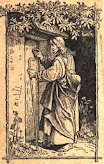[An interview with Maria Simma written by Sister Emmanuel of Medjugorje]
This Story Fills A Void:
One day, I read with great interest a book about the souls in Purgatory. It struck me so much because it related very recent testimonies and also explained very well the Church's doctrine on the subject. It is a book by Maria Simma, called The Souls in Purgatory ...Straight away, I wrote to the editor who told me that Maria Simma is alive. Quickly, I contacted her and she agreed to meet me to answer my questions, which were many! I was delighted, because each time I have the opportunity to speak or preach on the poor souls, I've found that there is an immense, extraordinary interest on the part of my listeners. Often, they beg me to tell them more, pushing me further, asking me: "Tell us more, other things about these souls." I saw clearly that this fulfilled a vital thirst, a thirst to know what is waiting for us, each of us, after death.
It must be said too that these things are scarcely taught any more in parishes, in regular catechism, in chaplaincies, practically nowhere. So there's a great emptiness, a great lack, if you prefer, a great ignorance, even a certain anguish in the face of these realities of the final things. Therefore, this booklet will help us not only to get rid of this anguish once and for all, with regard to Purgatory but will also enlighten us, hopefully, and enable us to understand that God's plan for us, for our destiny, is absolutely magnificent, splendid, worthy of our enthusiasm! Also, that we have in our hands an immense power on this earth to give happiness for ourselves as well, in our own lives.
Today, Maria Simma is 82; she lives alone in her little house in Sonntag, a very lovely village in the Vorarlberg mountains in Austria, and that is where I met her.
Who is Maria Simma?
A simple country woman who, since her childhood, has prayed a great deal for the souls in Purgatory. When she was twenty-five, she was favored with a very particular charism in the Church, very rare too, the charism of being visited by the souls in Purgatory. She is a fervent Catholic and has a great humility -- this struck me a lot; she has a great simplicity too. She is very much encouraged in her task by her parish priest and her bishop. In spite of the quite extraordinary character of her charism, she lives in real poverty. For example, in her little room we hardly had enough space to move around the chairs she had offered us...
An extraordinary charism? Yes, but which obviously has deep roots in the history of the church, for many are the saints -- canonized or not -- who have exercised this charism. I could mention, for example, St. Gertrude, St. Catherine of Genoa, who wrote much on the subject. Maryam of Jesus, St. Margaret Mary of Paray-le-Monial who had the vision of the Sacred Heart, the Holy Cure of Ars, Blessed Faustina, St. John Bosco, Blessed Maryam of Bethlehem, etc. A book could be written on the subject; in fact I think several have! When we look closely at the teaching of these saints, we see that all of them say the same thing; and Maria Simma for her part only relives their beautiful testimony. This is why I did not hesitate to interview her, as she has the advantage for us of living in our times, and is willing to make herself available. You can easily imagine that I swamped her with questions, I made the most of it!... The problem is she doesn't speak a word of French, and for this reason I had to use an interpreter. For the sake of brevity and clarity I will sum up some of Maria's answers and, at other times, give you the translation of her own words. I will also add, here and there, my personal comments.
The Interview with Maria Simma
Maria, Can you tell us how you were visited for the first time by a soul in Purgatory?
Yes, it was in 1940. One night, around 3 or 4 o'clock in the morning, I heard someone coming into my bedroom. This woke me up; I looked to see who on earth could have walked into my bedroom.
Were you afraid?
No, I'm not at all the fearful. Even when I was a little child, my mother said I was a special child because I was never afraid.
So, that night...tell us!
Well, I saw a complete stranger. He walked back and forth slowly. I said to him severely: "How did you get in here? Go away!" But he continued to walk impatiently around the bedroom, as if he hadn't heard. So I asked him again; "What are you doing?" but as he still didn't answer, I jumped out of the bed and tried to grab him, but I grasped only air. There was nothing there, So I went back to bed, but again I heard him pacing back and forth.I wondered how I could see this man, but I couldn't grab him. I rose again to hold onto him and stop him walking around; again, I grasped only emptiness. Puzzled, I went back to bed. He didn't come back, but I couldn't get back to sleep. The next day, after Mass, I went to see my spiritual director and told him everything. He told me that if this should happen, I shouldn't ask, "Who are you?: but "What do you want from me?" The following night, the man returned, definitely the same man. I asked him, "What do you want from me?" He replied: "Have three Masses celebrated for me and I will be delivered."So I understood that it was a soul in Purgatory. My spiritual father confirmed this.He also advised me never to turn away the poor souls, but to accept with generosity whatever they asked of me.
And afterwards, the visits continued?
Yes. For several years, there were only three or four souls, above all in November. Afterwards, there were more.
A Love Wound
What do these souls ask of you?
In most cases, they ask to have Masses celebrated and that one be present at these Masses; they ask to have the rosary said and also that one make the Stations of the Cross. At this point, the major question is raised: What exactly is Purgatory? I'd say that it's a marvelous invention of God. Let me give you an image which is my own. Suppose that one day a door opens, and a splendid being appears, extremely beautiful, of a beauty that has never been seen on earth. You are fascinated, overwhelmed by this being of light and beauty, even more so that this being shows that he is madly in love with you -- you have never dreamed of being loved so much. You sense too that he has a great desire to draw you to him, to be one with you. And the fire of love which burns in your heart impels you to throw yourself into his arms. But wait -- you realize at this moment that you haven't washed for months and months, that you smell bad; you nose is running, your hair is greasy and matted, there are big dirty stains on your clothes, etc. So you say to yourself, "No, I just can't present myself in this state. First I must go and wash: a good shower, then straight away I'll come back."
But the love which has been born in your heart is so intense, so burning, so strong, that this delay for the shower is absolutely unbearable. And the pain of the absence, even if it only lasts for a couple of minutes, is an atrocious wound in the heart, proportional to the intensity of the revelation of the love -- it is a "love-wound".
Purgatory is exactly this. It's a delay imposed by our impurity, a delay before God's embrace, a wound of love which causes intense suffering, a waiting, if you like, a nostalgia for love. It is precisely this burning, this longing which cleanses us of whatever is still impure in us. Purgatory is a place of desire, a made desire for God, desire for this God whom we already know, for we have seen him, but with whom we are not yet united.
Now I am going to ask Maria to clarify a fundamental point: Maria, do the souls in Purgatory have, nevertheless, joy and hope in the mist of their suffering?
Yes. No soul would want to come back from Purgatory to the earth. They have knowledge which is infinitely beyond ours. They just could not decide to return to the darkness of the earth. Here we see the difference from the suffering that we know on earth. In Purgatory, even if the pain of the soul is terrible, there is the certitude of living forever with God. It's an unshakeable certitude. The joy is greater than the pain. There is nothing on earth which could make them want to live here again, where one is never sure of anything.
Maria, can you tell us now if it is God who sends a souls into Purgatory, or if the soul itself decides to go there?
It is the soul itself which wants to go to Purgatory, in order to be pure before going to Heaven. The souls in Purgatory adhere fully to God's will; they rejoice in the good, they desire our good and they love very much: they love God, and they love us too. They are perfectly united to the Spirit of God, the light of God.
Maria, at the moment of death, does one see God in full light or in an obscure manner?
In a manner still obscure, but, all the same, in such brightness that this is enough to cause great longing. Actually, it's such a dazzling brightness compared with the darkness of the earth! And it's still nothing compared with the full light the soul will know when it arrives in Heaven. Here we can refer to "near death experiences." The soul is drawn by this light that it is agony for it to return to earth in its body, after this experience.
SOURCE : THE AMAZING SECRET OF THE SOULS IN PURGATORY - Chapter 2
Read more...















